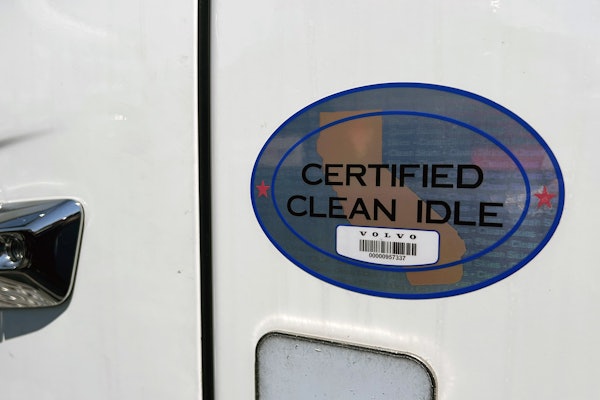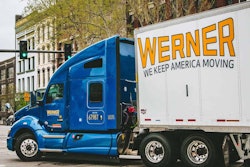Decker Truck Line
Fort Dodge, Iowa
Worked with various parties to establish a real-world test of biodiesel in heavy-duty trucking applications.
Alittle more than a year ago, Dale Decker worked as a lobbyist for the Iowa Motor Truck Association, advocating state legislation of interest to Iowa trucking operations. One of the major bills the Iowa Legislature was considering was a renewable fuels infrastructure bill, and IMTA’s interest was ensuring that biodiesel production facilities complied with quality assurance standards set by ASTM International (formerly the American Society for Testing and Materials). IMTA didn’t want to encourage the sale of biodiesel that would perform badly or even damage trucks. “Our main concern was that bad product not be sold to the trucking industry,” Decker says.
As Decker worked the legislation, he learned a great deal about biodiesel and made numerous contacts among groups pursuing biodiesel, such as the National Biodiesel Board and the Iowa Soybean Association. It wasn’t surprising that biodiesel was popular in an agricultural state like Iowa, which would benefit financially from the increased demand for products like soybeans. But nationally, interest in biodiesel also was growing, in part because of skyrocketing diesel prices and concern over dependence on foreign oil. Indeed, by October 2005, even the American Trucking Associations had endorsed biodiesel in blends of up to 5 percent. A few states were beginning to mandate the sale of biodiesel to some degree, and others are offering tax breaks and other incentives for its production or use.
Fast forward a few months to the summer of 2006. Decker now is back working with his family-owned trucking company, Decker Truck Line, a Fort Dodge, Iowa-based carrier operating more than 600 power units. The trucking company had been considering biodiesel to a limited degree when Decker was approached by the Iowa Soybean Association about conducting a demonstration project in conjunction with Iowa Central Community College.
Decker – the trucking company’s director of industry and government relations – was receptive. In fact, during the lobbying over the renewable energy bill, he and others at IMTA had tossed around the idea of conducting some kind of test program for biodiesel in trucking.
So during the summer of 2006, Decker met with representatives to establish a protocol and logistics of a demonstration project in which Decker Truck Line would operate equipment in a manner that would allow for a valid comparison of biodiesel and normal petroleum-based diesel. Iowa Central – led by Don Heck, who heads the college’s biotech and biofuels technology programs – would support the test by performing the necessary lab work and recordkeeping to assess engine wear, fuel consumption, maintenance costs and so on.
Decker Truck Line, Iowa Central and other backers of the program announced the initiative in a news conference Oct. 31. The actual test had begun a few weeks earlier.
For its part, Decker Truck Line eventually plans to operate at least 20 trucks in the test – 10 using biodiesel and 10 using petroleum-based fuel. The two groups of trucks will run on the same routes with the same lanes so that the test can focus on the differences between diesel and biodiesel. “The only variable is the fuel,” Decker says.
The trucking company is using a 20 percent biodiesel blend, commonly known as B20. Decker wanted to run the maximum blend allowed under warranty by the carrier’s engine supplier, while the company’s maintenance department preferred a more conservative approach. “They wanted to stay at 10 percent – I wanted to go to 30 percent. We compromised.”
Test limited at first
To ensure quality and consistency, Decker Truck Line is using only a soy-based biodiesel supplied by Renewable Energy Group, and the fleet is blending its own biodiesel at its Fort Dodge facility. Because fueling currently must take place in Fort Dodge, the test is limited to those operations that invariably can be conducted out and back without having to refuel. Initially, the trucking company has six trucks involved in the test – three running each type of fuel – operating principally to Chicago and Minneapolis.
The carrier will try to add more trucks to the test as it takes deliveries in December, and ultimately Decker wants half of the trucks in the test to be equipped with 2007 engines. But the availability of biodiesel that the carrier is comfortable with likely will slow the full rollout. After all, if a truck running on biodiesel has to fuel with regular diesel because that is all that’s available, the test is wrecked as far as that truck is concerned. “We need a fuel supply in more areas,” Decker says, adding that the company is considering adding biodiesel facilities at its Davenport, Iowa, terminal.
Supporters of the test have dubbed it the “2 Million Mile Haul,” as that will be the cumulative mileage logged. At the end of the study, they plan a Haul to the Hill, which will involve taking the results to the Iowa Capitol – along with one or more of the trucks used in the study.
Decker Truck Line isn’t the first trucking operation to try biodiesel, but it may be the first – at least in the private sector – to test biodiesel under controlled conditions over a period of time. “The main goal is that we need a standard,” Decker says. “We need to increase availability, publicize it and get people to use it.” Publicity is key because the supply won’t be sufficient “until we start breaking down the doors of the fuel companies saying we want this stuff.”
Decker is committed to the protocol for a valid test, but he’s personally quite confident the test will show biodiesel to be a sound alternative. While the jury is still out on fuel economy, Decker believes that biodiesel can restore what ultra-low-sulfur fuel took away: natural lubricity. But more important, biodiesel can improve the nation’s energy security. “It’s made in our country – it doesn’t come from the Middle East. It’s a very good thing for the trucking industry.”
Innovators profiles carriers and fleets that have found innovative ways to overcome trucking’s challenges.
If you know a carrier that has displayed innovation, contact Avery Vise at [email protected] or (800) 633-5953.







